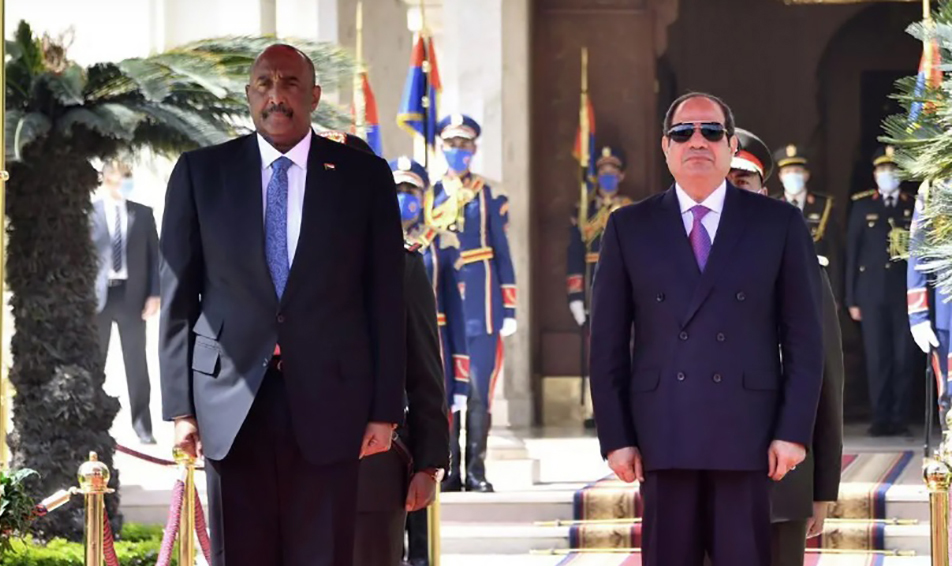
After General Abdel Fattah al-Burhans visit to Cairo: Will Egypt play a positive role in ending the destructive April war?
By Abdulrahman Al-Ajab
Four and a half months after the outbreak of the destructive April war, the Sudanese Army Commander, General Abdel Fattah al-Burhan, emerged from the General Command headquarters, also known to the public as Al-Berdoum. After leaving, he visited several military units, including a trip to Port Sudan, the temporary administrative capital of the country. Burhan chose Egypt as his first foreign visit.
Historically, Sudanese-Egyptian relations have struggled to achieve the minimum level of internal consensus in Sudan. These relations were tense during the early stages of Sudans independence under the government of Abdullah Khalil. They improved during General Abbouds era but deteriorated again during the Second Democracy, only to improve during President Nimeirys time before deteriorating once more during the Third Democracy.
In the 1990s, Sudanese-Egyptian relations witnessed their worst phase with the Islamic National Front coup in 1989. However, relations gradually improved in the last decade, starting from the year 2000 when the Salvation regime split, with Hassan al-Turabi and his allies exiting the project in favor of a coalition led by Bashir and Ali Osman Mohamed Taha, which eventually abandoned the Islamic civilizational project and opened up both domestically and internationally.
In the past four years, Sudanese-Egyptian relations experienced significant developments after the overthrow of President Omar al-Bashirs regime. Relations reached their peak as both parties adopted similar stances on the Ethiopian Renaissance Dam crisis. However, the October 25th coup led by al-Burhan disrupted the trajectory of these relations.
When looking at the historical fluctuations of Sudanese-Egyptian relations, it becomes clear that these relations cannot thrive or evolve unless they transform into relations between two states, not two regimes, one in Cairo and the other in Khartoum. In other words, these relations should be based on unchanging principles, representing a stable direction built on mutual interests, political consensus, and broad acceptance among the people.
On the Egyptian side, there doesnt seem to be an issue in this regard. Egypt, both its government and its people, recognizes the importance of Sudan and its unique position in their collective consciousness and emotional attachment.
However, on the other side, Sudan has faced numerous challenges, leading to the incomplete realization of its national project. Complicated issues related to identity, legitimacy, national integration, and political instability have plagued the country, particularly due to the ideological project of the Salvation regime. This eventually led to the division of Sudan into two states, North and South. After the overthrow of the Salvation regime through a popular revolution, remnants of the old regime returned and disrupted the achievements of the December Revolution, sparking the destructive April war.
Given these complexities in Sudan-Egypt relations and the regional tensions at play, the fate of cooperation and coordination between the two countries is contingent on their interests, motivations, and their ability to overcome sources of tension. However, in the absence of a legitimate government in Sudan due to the destructive April war, it is expected that Cairo will receive General al-Burhan in his first foreign visit since the war began on April 15th.
It is evident that the Egyptian government, led by President Abdel Fattah al-Sisi, supports the Sudanese Army, which they see as a national institution representing all Sudanese. They view the Rapid Support Forces (RSF) as a militia. However, Egyptian support for the Sudanese Army is likely contingent on removing elements of the Islamic Front from the military establishment, a secret condition that Burhan may have accepted.
Amidst these complexities and the impact of regional tensions on Sudanese-Egyptian relations, it is essential for Egypt, ethically, to play a positive role in ending the destructive April war. This positive role should involve supporting a negotiated solution through the Jeddah platform, rather than military support for the Sudanese Army to continue the war and achieve a military victory. Such a military approach would only increase the suffering of the Sudanese people and further damage Sudans infrastructure and economy. If Egypt chooses to support a negotiated solution, it will undoubtedly earn the appreciation and respect of the Sudanese people.


